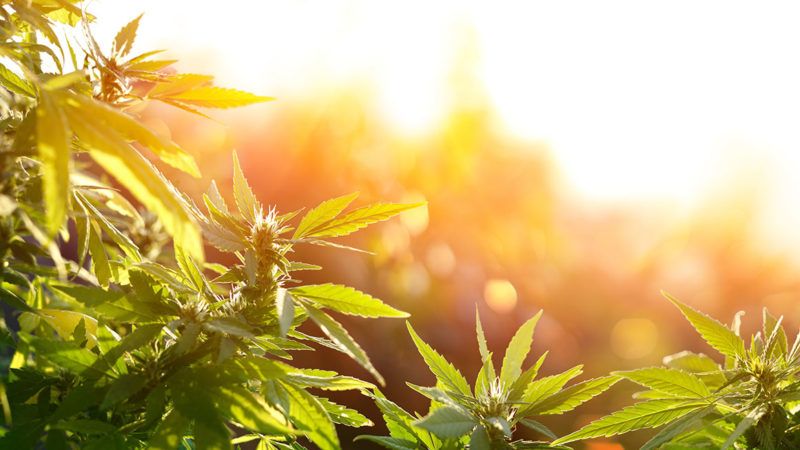Drugs Declare Victory in War on Drugs
States where recreational use has been legalized now include about a third of the U.S. population.

The 2020 elections delivered a resounding victory for drug policy reformers, who won everywhere their proposals were put to a vote. Across the country, in red and blue states, on both coasts and in between, in the Midwest and the Deep South, voters passed ballot initiatives that not only continued to reverse marijuana prohibition but also broke new ground in making drug laws less punitive and more tolerant.
New Jersey's approval of marijuana legalization was expected. Preelection surveys consistently put public support above 60 percent, although the actual margin of victory was a few points bigger than the polls suggested.
The outlook in Arizona, where voters rejected legalization in 2016, had been iffier. Public support averaged 56 percent in five polls conducted from mid-May to mid-October, and voters have been known to have second thoughts about legalization as Election Day approaches. In the end, legalization won by nearly 20 points. Survey averages likewise underestimated public support in Montana, where voters approved legalization by a 14-point margin, and Mississippi, where voters favored a relatively liberal medical marijuana initiative by a margin of nearly 3–1.
And who would have predicted that South Dakotans, who are overwhelmingly Republican and conservative, would make their state the first jurisdiction in the country to simultaneously legalize medical and recreational marijuana? Voters favored the former measure by more than 2–1, while the latter won by eight points.
The South Dakota results were not the only first. By a margin of more than 3–1, voters in Washington, D.C., approved quasi-decriminalization of "entheogenic plants and fungi," including psilocybin mushrooms, peyote, iboga root, and plants that contain dimethyltryptamine. That initiative, which says suppressing the use of such substances should be "among the lowest law enforcement priorities," goes further than similar measures enacted recently in Denver, Ann Arbor, Oakland, and Santa Cruz, since it applies to noncommercial production and distribution as well as possession and covers a wider range of psychedelics.
Oregon, meanwhile, became the first state to legalize psilocybin (the main psychoactive ingredient in "magic mushrooms") and the first to decriminalize possession of all drugs. The psilocybin initiative, which won by a margin of more than 11 points, allows adults 21 or older, regardless of whether they have a medical or psychiatric diagnosis, to consume the drug at state-licensed centers. The decriminalization measure, which was supported by nearly three-fifths of voters, makes low-level, noncommercial possession of controlled substances, which was previously a misdemeanor punishable by up to a year in jail, a citable offense punishable by a $100 fine.
The 2020 returns confirmed that marijuana prohibition—which two-thirds of Americans oppose, according to Gallup—is on its way out. Fifteen states have now approved legalization, up from 11 before Election Day. States where recreational use has been legalized now include about a third of the U.S. population.
The results also pointed the way toward less oppressive treatment of other psychoactive substances. In 2019, when Denver became the first jurisdiction in the country to make psilocybin use a low law enforcement priority, it might have seemed like a symbolic victory with minimal practical consequences. But a similar Denver initiative dealing with marijuana, passed in 2007, helped pave the way for the 2012 legalization of cannabis in Colorado, the first state to allow recreational use. Less than two years after Denver's psilocybin vote, Oregon already has taken the next step.
Oregon's decriminalization initiative, which covers notorious substances such as heroin, fentanyl, cocaine, and methamphetamine as well as psychedelics such as LSD, shows voters can be persuaded that it is wrong to treat drug users as criminals. They will instead be treated less severely than drivers who speed or park illegally. The initiative's backers estimated that it will reduce possession arrests by more than 90 percent. While drug users can avoid the $100 fine by undergoing a "health assessment" at an "addiction recovery center," they are not required to do so. The assessments are supposed to "prioritize the self-identified needs of the client."
Americans may not be ready to eliminate all penalties for drug use, let alone recognize the moral dubiousness of continuing to arrest and imprison people who merely aid and abet behavior that never should have been treated as a crime. But the history of marijuana reform shows that incremental changes can eventually lead to a fundamental reconsideration of the way the government treats psychoactive substances that politicians do not like.


Show Comments (43)